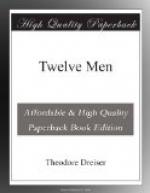“Yes,” I replied doubtfully, deciding to follow this up later. “But just what is it you do in a needy case? One instance?”
“Why, one night I was passing a little house in this town,” he went on, “and I heard a woman crying. I went right to the door and opened it, and when I got inside she just stopped and looked at me.
“‘Madam,’ I said, ’I have come to help you, if I can. Now you tell me what you’re crying for.’
“Well, sir, you know she sat there and told me how her husband drank and how she didn’t have anything in the house to eat, and so I just gave her all I had and told her I would see her husband for her, and the next day I went and hunted him up and said to him, ’Oh, brother, I wish you would open your eyes and see what you are doing. I wish you wouldn’t do that any more. It’s only misery you are creating.’ And, you know, I got to telling about how badly his wife felt about it, and how I intended to work and try and help her, and bless me if he didn’t up and promise me before I got through that he wouldn’t do that any more. And he didn’t. He’s working today, and it’s been two years since I went to him, nearly.”
His eyes were alight with his appreciation of personal service.
“Yes, that’s one instance,” I said.
“Oh, there are plenty of them,” he replied. “It’s the only way. Down here in New London a couple of winters ago we had a terrible time of it. That was the winter of the panic, you know. Cold—my, but that was a cold winter, and thousands of people out of work—just thousands. It was awful. I tried to do what I could here and there all along, but finally things got so bad there that I went to the mayor. I saw they were raising some kind of a fund to help the poor, so I told him that if he’d give me a little of the money they were talking of spending that I’d feed the hungry for a cent-and-a-half a meal.”
“A cent-and-a-half a meal!”
“Yes, sir. They all thought it was rather curious, not possible at first, but they gave me the money and I fed ’em.”
“Good meals?”
“Yes, as good as I ever eat myself,” he replied.
“How did you do it?” I asked.
“Oh, I can cook. I just went around to the markets, and told the market-men what I wanted—heads of mackerel, and the part of the halibut that’s left after the rich man cuts off his steak—it’s the poorest part that he pays for, you know. And I went fishing myself two or three times—borrowed a big boat and got men to help me—oh, I’m a good fisherman, you know. And then I got the loan of an old covered brickyard that no one was using any more, a great big thing that I could close up and build fires in, and I put my kettle in there and rigged up tables out of borrowed boards, and got people to loan me plates and spoons and knives and forks and cups. I made fish chowder, and fish dinners, and really I set a very fine table, I did, that winter.”




